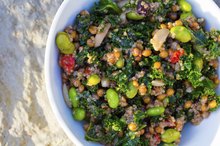Can Vitamins Prevent the Flu?
Influenza, more commonly known as the flu, is a viral infection that affects your upper respiratory system, causing symptoms such as congestion, cough, headache, fever, chills and fatigue. It is a highly contagious illness and is spread through the air and by touching contaminated surfaces. Although vitamins may not cure the flu, they may help bolster immune system function, reducing your risk of contracting an influenza infection. Check with your doctor before increasing your vitamin intake to prevent the flu.
Vitamin C
Vitamin C is among the best known immune system-enhancing vitamins available. This vitamin may stimulate your body's production of interferon, a chemical that helps destroy viral infections, according to Phyllis Balch, author of "Prescription for Nutritional Healing." It also may increase white blood cell count, protecting your body against influenza infection 1. Boost your intake of vitamin C by adding foods to your diet such as:
- kiwi fruit
- pomegranates
- blueberries
- strawberries
- spinach
- limes
- lemons
- oranges
Because your body requires large doses of vitamin C to ward off influenza, as much as 10,000 milligrams per day, consider a vitamin supplement to further increase your vitamin C intake.
- Vitamin C is among the best known immune system-enhancing vitamins available.
- This vitamin may stimulate your body's production of interferon, a chemical that helps destroy viral infections, according to Phyllis Balch, author of "Prescription for Nutritional Healing."
Vitamin B-5
Foods and Vitamins to Help Heal Nerve Endings
Learn More
Vitamin B-5, also known as pantothenic acid, may stimulate the production of adrenal glands, providing your body with hormones for enhanced immune system response. It also may increase production of antibodies that attack and destroy the influenza virus, according to Balch. Vitamin B-5 also improves metabolism of carbohydrates and proteins from food sources that your body uses for energy and immune system health. This vitamin is found in B-complex vitamin supplements, as well as foods such as mushrooms, rye, whole wheat bread and garbanzo beans.
- Vitamin B-5, also known as pantothenic acid, may stimulate the production of adrenal glands, providing your body with hormones for enhanced immune system response.
Vitamin D
Vitamin D is an essential vitamin that your body produces when your skin is exposed to ultraviolet rays from the sun. However, this vitamin also is available in supplement form as well as from food sources such as:
- eggs
- dairy products
- tuna
- salmon
- mackerel
- halibut
This vitamin may enhance your immune system's ability to produce proteins that fight disease-producing microbes, according to the Harvard School of Public Health. However, evidence linking vitamin D to protection from influenza is largely anecdotal.
Vitamin A
Vitamins For Pancreatitis
Learn More
Like vitamin C, vitamin A may stimulate the production of white blood cells that destroy the influenza virus. It also is a potent antioxidant, which may prevent damage to your upper respiratory tract caused by toxins and free radical cells. Vitamin A is typically included in multivitamin supplements and also is available as a stand-alone supplement. Check with your doctor before increasing your vitamin A intake to ward off the flu since daily doses of more than 10,000 International Units may be toxic to your liver.
- Like vitamin C, vitamin A may stimulate the production of white blood cells that destroy the influenza virus.
- It also is a potent antioxidant, which may prevent damage to your upper respiratory tract caused by toxins and free radical cells.
Related Articles
References
- Prescription for Nutritional Healing; Phyllis A. Balch
- Holick MF, Gordon CM. Patient Guide to Vitamin D Deficiency. The Journal of Clinical Endocrinology & Metabolism. 2011;96(7):1-2. doi:10.1210/jcem.96.7.zeg33a
- Sunyecz JA. The use of calcium and vitamin D in the management of osteoporosis. Ther Clin Risk Manag. 2008;4(4):827-836. doi:10.2147/tcrm.s3552
- Giovannucci E, Liu Y, Hollis BW, Rimm EB. 25-hydroxyvitamin D and risk of myocardial infarction in men: a prospective study. Arch Intern Med. 2008;168(11):1174-1180. doi:10.1001/archinte.168.11.1174
- Gorham ED, Garland CF, Garland FC, et al. Optimal vitamin D status for colorectal cancer prevention: a quantitative meta analysis. Am J Prev Med. 2007;32(3):210-216. doi:10.1016/j.amepre.2006.11.004
- Lappe JM, Travers-Gustafson D, Davies KM, Recker RR, Heaney RP. Vitamin D and calcium supplementation reduces cancer risk: results of a randomized trial. The American Journal of Clinical Nutrition. 2007;85(6):1586-1591. doi:10.1093/ajcn/85.6.1586
- Prentice RL, Pettinger MB, Jackson RD, et al. Health risks and benefits from calcium and vitamin D supplementation: Women’s Health Initiative clinical trial and cohort study. Osteoporos Int. 2013;24(2):567-580. doi:10.1007/s00198-012-2224-2
- Urashima M, Segawa T, Okazaki M, Kurihara M, Wada Y, Ida H. Randomized trial of vitamin D supplementation to prevent seasonal influenza A in schoolchildren. Am J Clin Nutr. 2010;91(5):1255-1260. doi:10.3945/ajcn.2009.29094
- Salehpour A, Hosseinpanah F, Shidfar F, et al. A 12-week double-blind randomized clinical trial of vitamin D₃ supplementation on body fat mass in healthy overweight and obese women. Nutr J. 2012;11:78. doi:10.1186/1475-2891-11-78
- Carrillo AE, Flynn MG, Pinkston C, et al. Impact of vitamin D supplementation during a resistance training intervention on body composition, muscle function, and glucose tolerance in overweight and obese adults. Clin Nutr. 2013;32(3):375-381. doi:10.1016/j.clnu.2012.08.014
- Marcinowska-Suchowierska E, Kupisz-Urbańska M, Łukaszkiewicz J, Płudowski P, Jones G. Vitamin D Toxicity-A Clinical Perspective. Front Endocrinol. 2018;9:550. doi:10.3389/fendo.2018.00550
- Ross AC, Manson JE, Abrams SA, et al. The 2011 report on dietary reference intakes for calcium and vitamin D from the Institute of Medicine: what clinicians need to know. J Clin Endocrinol Metab. 2011;96(1):53-58. doi:10.1210/jc.2010-2704
- Bouillon R, Van Schoor NM, Gielen E, et al. Optimal vitamin D status: a critical analysis on the basis of evidence-based medicine. J Clin Endocrinol Metab. 2013;98(8):E1283-E1304. doi:10.1210/jc.2013-1195
- American Academy of Dermatology. Position Statement of Vitamin D. 2010.
- Taksler GB, Cutler DM, Giovannucci E, Keating NL. Vitamin D deficiency in minority populations. Public Health Nutr. 2015;18(3):379-391. doi:10.1017/S1368980014000457
- Holick MF, Binkley NC, Bischoff-Ferrari HA, et al. Evaluation, treatment, and prevention of vitamin D deficiency: an Endocrine Society clinical practice guideline. J Clin Endocrinol Metab. 2011;96(7):1911-1930. doi:10.1210/jc.2011-0385
- Cannell JJ, Vieth R, Umhau JC, et al. Epidemic Influenza and Vitamin D. Epidemiol Infect. 2006; 134:1129-40.
- Carrillo AE1, Flynn MG, Pinkston C, Markofski MM, Jiang Y, Donkin SS, Teegarden D. Impact of Vitamin D Supplementation During a Resistance Training Intervention on Body Composition, Muscle Function, and Glucose Tolerance in Overweight and Obese Adults. Clin Nutr. 2013 Jun;32(3):375-81. doi: 10.1016/j.clnu.2012.08.014. Epub 2012 Aug 31.
- Ginde AA, Mansbach JM, Camargo CA, Jr. Association Between Serum 25-Hydroxyvitamin D Level and Upper Respiratory Tract Infection in the Third National Health and Nutrition Examination Survey. Arch Intern Med. 2009; 169:384-90.
- Giovannucci E, Liu Y, Hollis BW, Rimm EB. 25-hydroxyvitamin D and Risk of Myocardial Infarction in Men: a Prospective Study. Arch Intern Med. 2008; 168:1174-80.
- Gorham ED, Garland CF, Garland FC, Grant WB, Mohr SB, Lipkin M, Newmark HL, Giovannucci E, Wei M, Holick MF. Optimal Vitamin D Status for Colorectal Cancer Prevention: a Quantitative Meta-analysis. Am J Prev Med. 2007 Mar;32(3):210-6.
- Heaney, Robert P. “The Vitamin D Requirement in Health and Disease.” The Journal of Steroid Biochemistry & Molecular Biology 97 (2005):13-9.
- Holick MF. Vitamin D. In: Shils M, Olson J, Shike M, Ross AC, ed. Modern Nutrition in Health and Disease, 9th ed. Baltimore: Williams and Wilkins, 1999.
- National Institutes of Health Office of Dietary Supplements. Vitamin D: Dietary Supplement Fact Sheet. University of Ottawa Evidence-based Practice Center. Effectiveness and Safety of Vitamin D in Relation to Bone Health. Agency for Healthcare Research and Quality. Aug 2007: 07-E013.
- Salehpour A1, Hosseinpanah F, Shidfar F, Vafa M, Razaghi M, Dehghani S, Hoshiarrad A, Gohari M. A 12-week Double-blind Randomized Clinical Trial of Vitamin D₃ Supplementation on Body Fat Mass in Healthy Overweight and Obese Women. Nutr J. 2012 Sep 22;11:78. doi: 10.1186/1475-2891-11-78.
- Urashima M, Segawa T, Okazaki M, Kurihara M, Wada Y, Ida H. Randomized Trial of Vitamin D Supplementation to Prevent Seasonal Influenza A in Schoolchildren. Am J Clin Nutr. 2010 91:1255-60. Epub 2010 Mar 10.
- Wilkins, Consuelo H. and Yvette I. Sheline, et al. “Vitamin D Deficiency Is Associated with Low Mood and Worse Cognitive Performance in Older Adults.” American Journal of Geriatric Psychiatry 14 (2006): 1032-40.
Writer Bio
Owen Pearson is a freelance writer who began writing professionally in 2001, focusing on nutritional and health topics. After selling abstract art online for five years, Pearson published a nonfiction book detailing the process of building a successful online art business. Pearson obtained a bachelor's degree in art from the University of Rio Grande in 1997.









